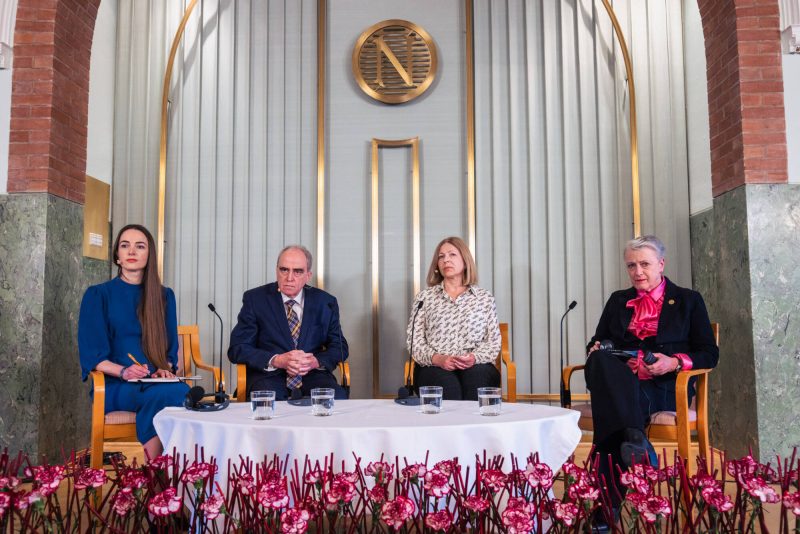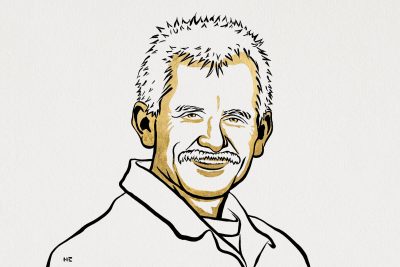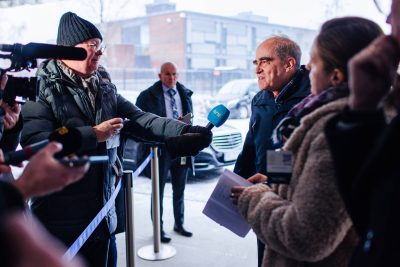Russia’s war on Ukraine is far from over, neither is the “unseen war” within Belarus, but representatives of those awarded the Nobel Peace Prize for promoting human rights in all three countries are already demanding that their oppressors be brought to justice. Topping their lists of those “who must be punished” are the despised leaders of Russia and Belarus, Vladimir Putin and Alexander Lukashenko.

“Russia has never been punished” for “atrocities” committed in many countries, not just Ukraine, claimed the leader of Ukraine’s Center for Civil Liberties, Oleksandra Matviichuk, at a press conference at the Norwegian Nobel Center in Oslo on Friday. “Not in Syria either. They think they can get away with anything.”
She and representatives for her fellow co-winners have all arrived in Oslo for this year’s traditional Nobel Peace Prize ceremony. It’s always held on December 10, the anniversary of prize benefactor Alfred Nobel’s death.
Matviichuk believes the war on her homeland is “genocidal” in character and that she has “no doubt” that sooner or later, Putin will be brought to justice. He’ll only stop his aggression “when he is stopped,” she added, which is why “it’s so important that the international community helps Ukraine” in its fight not just for its own freedom but for human rights, freedom of expression and democracy.
Putin, Matviichuk claimed, is not afraid of NATO but of freedom itself. “This is not a war between two states,” she said, “it’s a war between systems.” She also called for Russia to be excluded as a permanent member of the UN Security Council, where it’s been able to veto all of the majority’s calls for Russia to halt its repeated attacks on Ukraine.
All three Peace Prize co-winners, including the Russian human rights organization Memorial and human rights advocate Ales Bialiatski of Belarus, support urgent establishment of an international tribunal with the aim of bringing Putin, Lukashenko and those in charge of carrying out their orders to justice. “We must establish an international tribunal now,” Matviichuk said.

Bialiatski was not allowed to travel to Oslo to formally accept his Nobel Peace Prize tomorrow. He’s been held in prison in Belarus for more than a year because of his human rights activism. His wife, Natallia Pintchuk, arrived in his place and stressed that an “unseen” war is also underway in their homeland between citizens craving freedom and the repressive Lukashenko government that many equate to a dictatorship.
“This prize is not only for Ales,” she said, noting that she’s only been able to meet her husband once during his imprisonment under terrible conditions. “It’s for attention on Belarus. We need to remember this war against Belarus’ own people.”
Yan Rachinsky, board leader for Memorial, claimed he doesn’t think about his own personal security in Russia, or lack thereof, but characterized the human rights situation in his country as “terrible.” There’s nonetheless “lots of work going on” to try to change that, he said, albeit against difficult odds.

The organization Rachinsky leads was founded in 1987 by another Peace Prize winner, Andrei Sakharov, and human rights advocate Svetlana Gannushkina. They wanted to ensure that the victims of the communist regime’s oppression would never be forgotten, and Memorial eventually became the largest human rights organization in Russia.
The Norwegian Nobel Committee noted that it’s been at the forefront of efforts to combat miltarism and promote government based on the rule of law, but it’s been subjected to threats, imprisonments, disappearances of its workers and even murder for many years. Putin’s government most recently branded it as a “foreign agent” and ordered that it be forcibly liquidated and its documentation of past human rights abuses, especially during the Stalin era, be closed permanently.
There was a bit of a stir in Oslo just after all three representatives of the Nobel Peace Prize winners flew in on Thursday, because the leader of the Kyiv-based Center for Civil Liberties refused to be jointly interviewed by state broadcaster NRK and the BBC together with the leader of Russia’s Memorial. Her organization has also been honoured for advancing human rights and democracy in Ukraine, much like Memorial in Russia.

“Our country is at war with Russia,” Matviichuk told NRK in explaining why her organization wanted to break with tradition and be interviewed separately. She claimed she has “great respect” for Memorial and the work it does, but didn’t think it was right for a Ukrainian and a Russian organization to share a platform.
Rachinsky said he understood. “We have been and still are good friends,” he told NRK, “but it’s a complicated relationship.”
The Nobel Peace Prize awarded to all three co-winners in October will be formally presented in a traditional ceremony at the Oslo City Hall on Saturday. That will be followed by a torchlit parade honouring all the winners in Oslo, just before a banquet at the Grand Hotel. The winners were also welcomed to the Royal Palace for an audience with King Harald V and would be received at Parliament on Sunday.
NewsinEnglish.no/Nina Berglund

